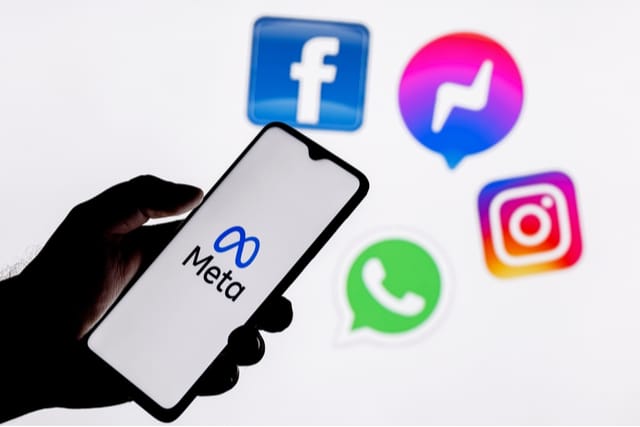
Tech companies say they will help employees with travel expenses for abortions following the overturning of Roe v Wade
The US Supreme Court has overturned Roe v Wade, ruling that there is no constitutional right to abortion in the United States. With more than half of states either implementing an immediate ban on abortions or intending to do so as soon as possible, there are serious concerns about women's health care. Large-scale protests continue across the country, but particularly in Washington DC.
While unable to help the majority of those affected by the ruling, many of the major technology companies have detailed the support they offer employees seeking abortion services. Among those to offer helps such as the reimbursement of travel expenses are Microsoft, Meta and Apple.
Meta has a new way for you to waste money -- buying virtual designer clothes in Avatars Store for Facebook, Instagram and Messenger
For people with less sense than money, there are NFTs to waste hard-earned cash on. But Meta is introducing a new way to part fools from their money -- Avatars Store.
These will be available for Facebook, Instagram and Messenger, and will give users the opportunity to buy digital clothes with which to adorn their avatar. Attempting to justify the selling of more digital fluff, Mark Zuckerberg insists that "digital goods will be an important way to express yourself in the metaverse and a big driver of the creative economy".
Researchers uncover cybercriminal stronghold targeting Facebook users
The Facebook Messenger 'Is That You?' video phishing scam has been around since 2017, but a recent investigation into it by researchers at Cybernews has led to the discovery of what they're calling a 'cybercriminal stronghold'.
Threat actors are using this to infect the social network with thousands of malicious links each day. The research has also identified at least five suspects, thought to be residing in the Dominican Republic.

Twitter Facebook LinkedIn Spy
How do you know if you're being targeted by an agent of a foreign power? It used to be easy, as soon as he ordered red wine with his fish* you knew he wasn't the right sort of chap.
Nowadays when nation states are more likely to befriend you on social media in order to try to steal sensitive data you can no longer rely on the wine list to help you spot a bad guy.

Why real-time experiences will make or break the metaverse
The metaverse is the latest battlefield for tech giants vying for business and consumer attention. Although the phrase has only fairly recently entered the public vernacular, when Facebook rebranded its parent company as Meta, it was actually coined in 1992 by author Neal Stephenson in 'Snowcrash'. In many ways its rise in popularity marks the 'coming of age' of virtual and augmented reality to date.
To make these new virtual worlds a success will require a truly real-time digital experience. Without this, our virtual experiences are unlikely to be lifelike and nor will they be "better" than real life. But in order to make this real-time digital experience in the metaverse a reality, organizations will need a raft of technical capabilities. This is a significant challenge for tech behemoths today, let alone in the metaverse future. So, what is needed to ensure the metaverse is a long-term success rather than a passing fad?

Meta is clamping down on irritating 'watchbait' videos on Facebook
The idea of clickbait is nothing new. Sensational headlines have been used since the early days of the press to draw in users, and it is something that has continued into the internet age. But there is also a related problem that blights social media platforms such as Facebook: watchbait.
The idea is much the same as a clickbait headline; videos are given misleading, overblown headlines and descriptions that often omit key details in a bid to get people to watch to the end. Now Meta has announced that it is taking action, including using an automatic detection system that will reduce the distribution reach of offending videos.

Facebook and Instagram will permit the promotion of violence against Russians and calls for the death of Putin
Meta has announced a temporary change in its hate speech policies, meaning that users in some countries will be allowed to post content that would otherwise have been banned. The change means that users of Facebook and Instagram will be able to promote violence against Russian soldiers, as well as call for the death of President Putin, without fear of censorship.
Posts that include violent speech such as "death to the Russian invaders" are to be permitted in numerous countries, but there is the matter of the context of the invasion of Ukraine to keep in mind. At the same time, the privacy-focused search engine DuckDuckGo has surprised many by announcing that it will downrate sites that publish Russian propaganda and disinformation.

Meta will warn you if someone screengrabs your encrypted Messenger chats
Meta is adding a new warning to encrypted chats in Messenger so that users will know if another participant has taken a screenshot of the conversation.
The company formerly known as Facebook has already implemented this same feature into messages sent when the app's Vanish Mode is activated. While Messenger has not been updated to prevent screenshots from being taken in in E2E encrypted chats or Vanish Mode conversations, the appearance of the warning should serve as a deterrent against secret screen grabbing.

Facebook tracks you across the web and Mozilla wants your help in finding out how
Everyone knows that Facebook collects data on people online and then uses this to tailor content and advertising. Exactly how it does this remains something of a mystery, however.
Mozilla has partnered with non-profit newsroom The Markup for what it’s calling the 'Facebook Pixel Hunt' to find out how Meta tracks people across the web through its pixel-powered ad network, and what it does with this collected data.

Meta launches new Privacy Center, leaving Facebook users the unenviable task of learning about privacy and security
TCFKAF (the company formerly known as Facebook), Meta, has launched Privacy Center, a new way for users to "learn more about our approach to privacy across our apps and technologies". Across five modules -- Security, Sharing, Collection, Use and Ads -- Meta gives users information about privacy across its services.
It also provides links to its endless and scattered collection of tools, settings and options for taking control of privacy and security. The new hub has already come in for criticism, however, as it places onus the burden of responsibility on users rather than hand-holding then through the process of locking down privacy.

Failure to launch: Meta's Novi pilot emphasizes massive 'trust' problem
The lack of public accessibility is the biggest barrier to the mainstream adoption of cryptocurrency. While many companies, such as Unbanked, VISA, and Square, have embraced and integrated various internationally accessible platforms and programs, tech giants like Meta have not been involved until now.
But on 19th October, Facebook (as it was still then) announced the launch of its own digital Novi wallet. The launch was part of the Novi wallet pilot program in the US and Guatemala. In partnership with Coinbase, a leading cryptocurrency exchange platform, the pilot program will allow users to securely and instantly send and receive money using Paxos stablecoin.

Meta explains why it is taking so long to bring end-to-end encryption to Facebook Messenger and Instagram -- and what it is doing in the meantime
Meta recently announced that the protection, privacy and security offered by end-to-end encryption will not be coming to Facebook Messenger or Instagram until some time in 2023. Until then, anyone looking to send secure messages through Meta's platform will have to turn to WhatsApp.
What was not made particularly clear at the time of the announcement, however, is just why there is such a delay. Now Meta has opened up and revealed some of the thinking behind holding back on the roll-out of end-to-end encryption across all of its messaging services.

Meta says there will be no end-to-end encryption for Facebook and Instagram messages until 2023
WhatsApp users may enjoy the benefits of end-to-end encryption, but the same cannot be said of messages sent via Facebook or Instagram. What's more, this is not going to be changing any time soon.
While Meta (or Facebook as it was at the time) previously announced plans to introduce encrypted messaging to the Facebook and Instagram platforms, there was heavy criticism from campaigners and organizations for child safety. Now the company has said end-to-end encryption will not be arriving until 2023.

Facebook outage 2021: A simple mistake with global consequences
In October, the internet was shaken by the Facebook outage that affected dozens of big-name companies, as well as millions of brands and businesses that advertise on Facebook’s platform. Because of something as simple as a misconfigured Domain Name System (DNS) record, every device with the Facebook app integration started DDoS-ing recursive DNS resolvers -- DDoS meaning "Distributed Denial of Service." This, in turn, caused overloading in countless cases across the board.
You might be thinking to yourself, "So, what? A few sites were offline for a couple of hours." But the outage brought to light other issues. Communications for the very Facebook employees that could fix this issue were crippled. Some of these hindrances went so far that people were unable to enter buildings because the physical badge system wasn't even online.

Meta is deleting a billion 'faceprints' and closing down Facebook's facial recognition system
Facebook's parent company, Meta, has announced a major shift for the social networking, saying it will no longer use facial recognition to identify users in photographs.
As well as closing down the facial recognition system, the company will also delete over a billion people’s individual facial recognition templates. Meta says that it is part of "company-wide move to limit the use of facial recognition in our products", and it is move that will be welcomed by privacy advocates.
